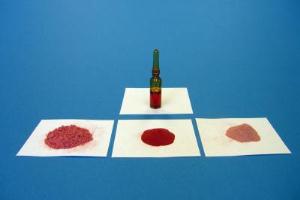
National Institute of Standards and Technology (NIST) researchers have developed new certified reference materials for measuring amounts of organic acids in dietary supplements formulated with Vaccinium berries - cranberries, blueberries and bilberries.
As described in the journal Analytical and Bioanalytical Chemistry, manufacturers and researchers can use this new suite of standard reference materials (SRMs) as quality assurance tools: berry SRMs.
Dietary supplement manufacturers often include health claims on products made with Vaccinium berries. Suggested benefits include prevention of urinary tract infections, reduced risk of certain cancers or Alzheimer's disease, and improved night vision.
Consumers may take such claims at face value, but one common problem with dietary supplement products containing berries is the risk of economic adulteration - dilution with less expensive juices, such as apple or grape, or the use of blueberries instead of bilberries as a cost-saver for the manufacturer. One way of telling whether or not a product has been adulterated is to measure organic acid ratios, which are specific to each type of berry.
Until now, analytical approaches for measuring organic acid ratios in berries, fruit juices, and dietary supplements have relied on the use of pure organic acid reference standards, which do not take into account the complexity of the whole berry. As a result, these methods could neither be validated as accurate nor used to certify reference materials to meet the needs and accuracy requirements of the Food and Drug Administration (FDA) and dietary supplement manufacturers.
NIST's new certified reference materials are:
- SRM 3281 Cranberry (Fruit)
- SRM 3282 Low-Calorie Cranberry Juice Cocktail
- SRM 3283 Cranberry Extract
- SRM 3284 Cranberry-Containing Solid Oral Dosage Form
- SRM 3285 Mixed Berry-Containing Solid Oral Dosage Form
- SRM 3287 Blueberry (Fruit)
- SRM 3291 Bilberry Extract
The seven SRMs were created as part of an ongoing collaboration to develop dietary supplement SRMs, involving NIST, the National Institutes of Health's Office of Dietary Supplements, and the FDA's Center for Drug Evaluation and Research.
SRMs are among the most widely distributed and used NIST products. The agency prepares, analyzes and distributes more than 1,000 different carefully characterized materials that are used throughout the world to check the accuracy of instruments and test procedures used in manufacturing, clinical chemistry, environmental monitoring, electronics, criminal forensics and dozens of other fields. For more information, see NIST's SRM website.
Further Information:
Melissa M. Phillips, Ryan J. Case, Catherine A. Rimmer, Lane C. Sander, Katherine E. Sharpless, Stephen A. Wise and James H. Yen:
Determination of organic acids in Vaccinium berry standard reference materials.
In: Analytical and Bioanalytical Chemistry; published online 27 June 2010, DOI 10.1007/s00216-010-3916-0
Source: National Institute of Standards and Technology, NIST
Last update: 10.11.2010
Perma link: https://www.internetchemistry.com/news/2010/nov10/organic-acids-reference-materials.php
More chemistry: index | chemicals | lab equipment | job vacancies | sitemap
Internetchemistry: home | about | contact | imprint | privacy
© 1996 - 2023 Internetchemistry
